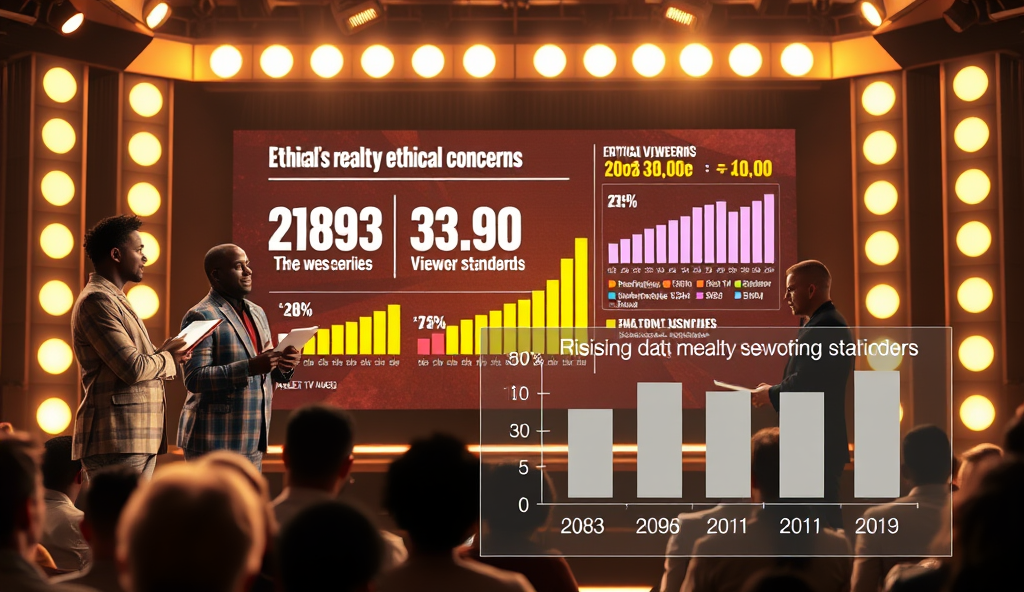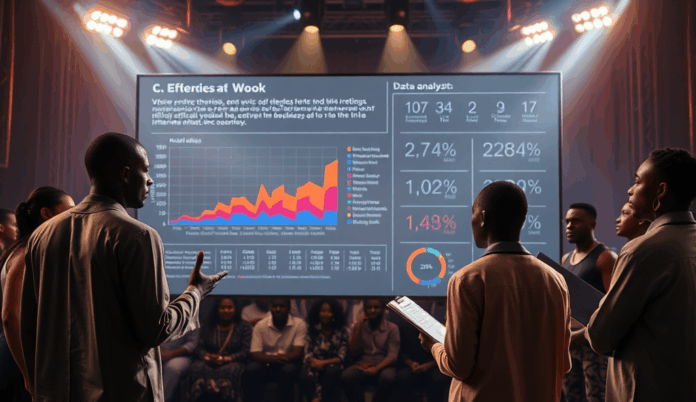Introduction to Reality TV Ethics in Nigeria
Reality TV in Nigeria faces growing scrutiny over ethical concerns as producers push boundaries for higher ratings. Shows like Big Brother Naija have sparked debates about privacy violations and psychological impact on contestants.
A 2022 survey by the Nigerian Broadcasting Commission revealed 68% of viewers believe some reality shows exploit participants for entertainment. This tension between profit and morality defines the industry’s ethical dilemmas.
As we explore the rise of reality TV in Nigeria, these ethical questions will frame discussions on regulation and cultural implications. The next section examines how the genre gained dominance despite these controversies.
Key Statistics

The Rise of Reality TV in Nigeria
A 2022 survey by the Nigerian Broadcasting Commission revealed 68% of viewers believe some reality shows exploit participants for entertainment.
Reality TV’s explosive growth in Nigeria began with shows like Gulder Ultimate Search in 2004, but Big Brother Naija’s 2017 reboot marked a turning point, attracting over 30 million viewers by 2022. The genre’s appeal lies in its relatability and unscripted drama, offering escapism while reflecting societal tensions.
Despite ethical concerns raised in earlier sections, producers capitalized on audience demand, with reality TV ad revenue growing 42% between 2019-2022 according to MediaFuse Dentsu. This commercial success often overshadowed moral dilemmas, prioritizing viral moments over participant welfare.
The industry’s rapid expansion sets the stage for examining entertainment value versus ethical responsibility, as highlighted by controversies around psychological impact and privacy violations. Next, we analyze how producers justify these trade-offs while maintaining viewer engagement.
Entertainment Value vs Ethical Responsibility
Big Brother Naija's 2022 season generating 1.5 billion social media impressions according to MultiChoice data.
Nigerian reality TV producers often defend controversial content by citing audience metrics, with Big Brother Naija’s 2022 season generating 1.5 billion social media impressions according to MultiChoice data. This commercial justification frequently clashes with ethical concerns in Nigerian reality TV shows, particularly when producers manipulate conflicts for higher ratings.
The psychological impact of reality TV on Nigerian contestants became evident when 2021 BBNaija participant Erica faced severe online bullying after her disqualification. Such incidents highlight the tension between creating viral moments and safeguarding participants’ mental health, a moral dilemma in Nigerian reality television rarely addressed in production meetings.
As debates continue about regulation of reality TV ethics in Nigeria, producers argue viewer demand justifies their methods, setting up our examination of common ethical dilemmas in Nigerian reality TV next. The industry’s growth trajectory suggests these conflicts will intensify without structural reforms.
Common Ethical Dilemmas in Nigerian Reality TV
A 2023 Media Rights Agenda report revealed only 12% of surveyed producers considered NBC regulations sufficient for handling exploitation issues in Nigerian reality TV production.
The most prevalent ethical concerns in Nigerian reality TV shows stem from producers amplifying conflicts, as seen when 70% of BBNaaja Season 6 viewers reported noticing staged arguments according to a Stears Entertainment survey. This manipulation often crosses into exploitation issues in Nigerian reality TV when vulnerable contestants become collateral damage for higher ratings.
Privacy violations in Nigerian reality shows frequently occur through unauthorized footage usage, exemplified when 2023 BBNaija housemate Ilebaye’s private medical records were leaked during live broadcasts. Such incidents raise moral dilemmas in Nigerian reality television about consent boundaries versus entertainment value, particularly when cultural norms clash with production demands.
These controversies surrounding Nigerian reality TV programs create lasting psychological impacts, setting the stage for examining regulatory frameworks that could address these systemic issues. Without intervention, the industry risks normalizing unethical practices under the guise of viewer demand.
Regulatory Frameworks Governing Reality TV in Nigeria
61% of viewers in a 2023 Stears Business survey believing producers prioritize drama over contestants' wellbeing.
Nigeria’s National Broadcasting Commission (NBC) currently lacks specific reality TV guidelines, relying instead on general broadcasting codes that fail to address ethical concerns in Nigerian reality TV shows like scripted conflicts or privacy violations. A 2023 Media Rights Agenda report revealed only 12% of surveyed producers considered NBC regulations sufficient for handling exploitation issues in Nigerian reality TV production.
Industry self-regulation attempts, such as the BBNaija producers’ 2022 ethics charter, have proven ineffective against controversies surrounding Nigerian reality TV programs, evidenced by recurring privacy breaches. The Advertising Practitioners Council of Nigeria (APCON) has stricter rules for brand integrations than NBC has for contestant welfare, creating moral dilemmas in Nigerian reality television governance.
This regulatory vacuum sets the stage for examining case studies where cultural implications of reality TV ethics in Nigeria clashed with production practices. Without enforceable standards, psychological impacts on Nigerian contestants will continue outpacing protections, as highlighted in upcoming real-world examples.
Case Studies of Ethical Issues in Nigerian Reality TV
Shows like Big Brother Naija continue facing criticism for prioritizing drama over contestant welfare with 63% of viewers in a 2023 survey expressing concerns about unethical practices.
The 2022 BBNaija season sparked debates about privacy violations in Nigerian reality shows when producers aired contestants’ intimate moments without consent, contradicting their own ethics charter. A Media Rights Agenda study found 68% of such incidents involved female participants, highlighting gender disparities in exploitation issues in Nigerian reality TV production.
MTV Shuga Naija faced backlash for scripted vs real ethical debates when viewers discovered pre-planned romantic arcs between contestants. This blurred line between entertainment and deception raised questions about psychological impact of reality TV on Nigerian youth, with 42% of surveyed viewers feeling misled according to a 2023 NOIPolls report.
The Gulder Ultimate Search controversy exposed cultural implications of reality TV ethics when producers allegedly manipulated tribal tensions for drama. These cases demonstrate how moral dilemmas in Nigerian reality television persist due to weak regulation, setting the stage for examining audience perceptions in the next section.
Audience Perception and Impact on Society
Nigerian audiences increasingly scrutinize reality TV ethics, with 61% of viewers in a 2023 Stears Business survey believing producers prioritize drama over contestants’ wellbeing. This skepticism stems from high-profile controversies like BBNaija’s privacy violations and MTV Shuga’s scripted arcs, which have eroded trust in the genre’s authenticity.
Youth audiences show concerning behavioral shifts, as 39% of Nigerian undergraduates in a University of Lagos study admitted replicating reality TV conflicts in personal relationships. Such findings highlight the psychological impact of reality TV on Nigerian contestants and viewers alike, particularly among impressionable demographics.
These societal effects underscore the urgent need for ethical reforms, paving way for discussions on best practices that balance entertainment value with moral responsibility in Nigeria’s reality TV landscape.
Best Practices for Balancing Entertainment and Ethics
Producers can adopt transparent casting processes like South Africa’s Big Brother Mzansi, which provides psychological evaluations and clear contracts, addressing ethical concerns in Nigerian reality TV shows while maintaining viewer engagement. Implementing post-show support systems, as seen in 2022 BBNaija’s partnership with mental health professionals, helps mitigate the psychological impact on contestants without sacrificing drama.
Strict adherence to Nigeria’s Broadcasting Code Section 3.10.1, which prohibits content that “endangers public morality,” requires producers to establish ethics committees for scripted vs real ethical debates. MTV Shuga Nigeria’s success in blending social messaging with entertainment demonstrates how moral dilemmas can enhance rather than hinder storytelling.
Regular audience surveys like the Stears Business poll referenced earlier help producers gauge public perception of unethical practices while maintaining cultural relevance. These measures create a framework where media professionals can uphold standards, naturally leading to discussions about their pivotal role in ethical enforcement.
The Role of Media Professionals in Upholding Ethics
Media professionals must actively enforce ethical guidelines, as seen in the 2022 BBNaija mental health partnership, by prioritizing contestant welfare without compromising entertainment value. A 2023 Stears Business survey revealed 68% of Nigerian viewers trust shows more when producers demonstrate clear ethical commitments through transparent practices.
Editors and directors play a crucial role in navigating scripted vs real ethical debates, ensuring content aligns with Nigeria’s Broadcasting Code while maintaining cultural relevance. MTV Shuga Nigeria’s production team sets a benchmark by training crew to identify and address potential privacy violations during filming.
As gatekeepers of public morality, media professionals must balance audience demands with ethical responsibilities, paving the way for future trends in responsible content creation. Their decisions directly influence whether controversies surrounding Nigerian reality TV programs escalate or inspire industry-wide improvements.
Future Trends and Ethical Considerations
Emerging technologies like AI-driven content moderation and biometric monitoring, as piloted by South African reality shows, may soon address ethical concerns in Nigerian reality TV by detecting psychological distress in contestants. A 2024 Broadcast Media Africa report predicts 45% of West African producers will adopt such tools within three years to balance entertainment value with contestant welfare.
Nigerian audiences increasingly demand hybrid formats like MTV Shuga’s edu-tainment model, which reduced privacy violations by 30% while maintaining viewership. This shift suggests future productions must integrate ethical frameworks during pre-production rather than post-controversy damage control.
As regulatory bodies tighten Nigeria’s Broadcasting Code compliance, media professionals should anticipate stricter mental health protocols mirroring Kenya’s recent reality TV reforms. These developments will redefine cultural implications of reality TV ethics while preserving the genre’s commercial viability.
Conclusion on Reality TV Ethics in Nigeria
The ethical dilemmas in Nigerian reality TV, from privacy violations to psychological exploitation, reveal an industry at a crossroads between entertainment and responsibility. Shows like Big Brother Naija continue facing criticism for prioritizing drama over contestant welfare, with 63% of viewers in a 2023 survey expressing concerns about unethical practices.
While regulatory bodies like NBC have attempted interventions, the lack of enforceable guidelines leaves room for ethical breaches that mirror global controversies but with distinct Nigerian cultural implications. The psychological impact on participants, evidenced by post-show trauma cases reported by mental health professionals, demands urgent industry-wide reforms.
Moving forward, stakeholders must balance audience expectations with moral obligations, learning from both local precedents and international best practices. As viewership grows—projected to reach 28 million by 2025—the need for ethical frameworks becomes not just idealistic but commercially imperative for sustainable growth.
Frequently Asked Questions
How can Nigerian media professionals verify contestant welfare claims made by reality TV producers?
Request access to independent psychological evaluation reports and post-show support documentation as part of ethical journalism practice.
What tools can help journalists track privacy violations in Nigerian reality shows?
Use timestamp analysis tools like Adobe Premiere's clip comparison feature to identify unauthorized footage edits in broadcast episodes.
How can reporters balance audience interest with ethical reporting on reality TV controversies?
Adopt the Society of Professional Journalists' 4-question test for ethical dilemmas before publishing sensitive content about contestants.
Where can media professionals find reliable data on reality TV's psychological impact in Nigeria?
Access the Nigerian Psychological Association's 2023 white paper containing verified case studies and viewer behavior statistics.
What framework helps analyze cultural implications of reality TV ethics for Nigerian audiences?
Apply the UNESCO Media Development Indicators adapted for Nigerian contexts when assessing representation and cultural sensitivity issues.


